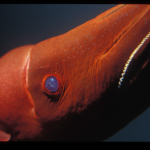“The IUCN Red List of Threatened Species reveals that some large species, like humpbacks, have seen numbers increase.
However, it warns that smaller species, including river dolphins, have declined as a result of human actions.
The IUCN added that it was unable to assess more than half of the world’s cetaceans because of a lack of data.
(snip)
The findings are likely to impact on the current stand-off between pro- and anti-whaling nations over the merits of a global moratorium on commercial whaling.
Pro-hunting nations could use the assessment to argue that the humpback whales’ recovery means that the mammals could now be caught sustainably.
Whereas anti-whaling countries will argue that the recovery is the result of the global ban, and that any form of hunting will again lead to a dangerous decline in numbers.
“It is a political question, and it will be answered in a political form,” Dr Reeves observed.
“I think it is really important to stress that the Red List is not about whether a given species can be exploited.
“It’s simply about looking at the status of these animals and giving people some idea where they are now in relation to where they used to be.”
Despite the improvement in the status of the two large species [ed. note: Humpback and Southern Right whales], the Red List showed that nearly a quarter of the 86 species assessed were considered to be at risk of extinction, nine of which were listed as Endangered or Critically Endangered.”
That last distinction is very important. The IUCN Red List is a snapshot in time. Taken over long periods the data is very useful for seeing trends, but a delist today can be a critically endangered in the next year or two. As mentioned in the article, nearly half of all marine mammals are “data deficient”. This is something we need to fix through a research agenda targeting the lesser known or charismatic marine mammals.
Photo Credit: AP






We got your data right here! – http://scienceblogs.com/zooillogix/2008/08/elbow_deep_in_whale_poop.php
Yeah. There’s a direct correlation with whale dookie and … something.
Stop killing whales.
heh heh heh heh he said dookie heh heh heh heh thats cool beavis
For those of you running windows: Cetacean Research Simulator
Seriously, though, given the quality of the data available(inadequate), are the gung-ho whalers actually that optimistic, or are they willing to do without whales in the mid to long term?
One thing that must be important about this kind of data is what time of year you do it. I know next to nothing about whales, but i am living next door to an ecologist studying some type of birds and she always gets really annoyed when papers print species numbers without saying when they were counted.